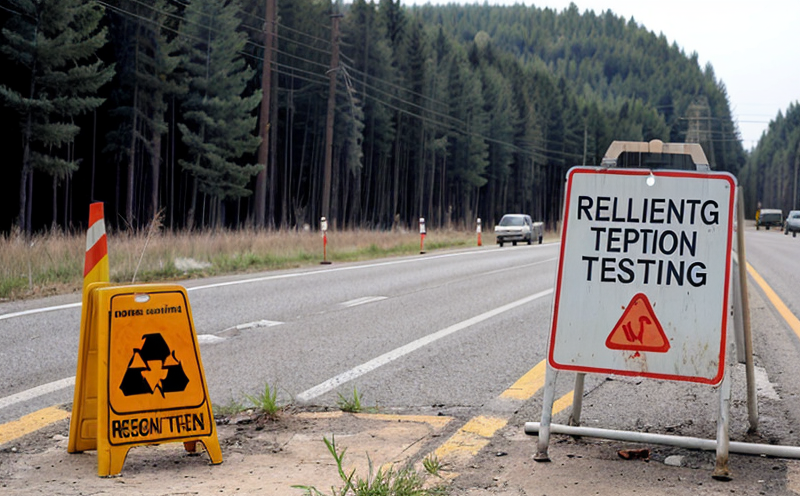ASTM D7286 Determination of Strontium-90 in Soils
The ASTM D7286 standard method is widely recognized as a robust protocol for determining the concentration of Strontium-90 (Sr-90) in soil samples. This radiometric test measures radioactive decay to quantify the presence of this beta-emitting isotope, which can be indicative of nuclear fallout or industrial contamination.
Strontium-90 is a byproduct of nuclear fission and has been a significant concern since its widespread release during atmospheric testing in the 1950s and early 1960s. The test aims to ensure that environmental samples are within acceptable regulatory limits, thereby promoting public health and safety.
Our laboratory adheres strictly to ASTM D7286 for accurate results. Our method involves several key steps: sample collection, preparation, extraction, purification, measurement, and reporting. The process begins with the collection of soil samples from specified locations. Samples are then dried, sieved, and homogenized to ensure a representative mixture.
Extraction and purification processes are critical for removing interfering elements that could skew results. We use specific reagents and solvents to isolate Strontium-90 from other isotopes in the sample matrix. The purified solution is then measured using a high-resolution gamma spectrometer, which detects and quantifies the radioactive decay of Sr-90.
The accuracy and precision of this method are paramount for regulatory compliance. Our laboratory employs state-of-the-art equipment and highly trained personnel to ensure that each step of the process adheres strictly to ASTM D7286 guidelines. This includes maintaining a controlled environment, using calibrated instruments, and employing quality control measures at every stage.
The results of this analysis are reported with high precision, including detection limits, confidence intervals, and any potential sources of error or bias. Our reports provide clear and concise information that can be used by regulatory bodies, environmental agencies, and other stakeholders to make informed decisions about the safety and health implications of soil contamination.
Understanding the scope of this test is crucial for various applications in the nuclear sector. Environmental radiation testing helps identify potential risks associated with nuclear activities or natural occurrences. By adhering strictly to ASTM D7286, we ensure that our findings are reliable and can be trusted by all parties involved.
Benefits
The benefits of using the ASTM D7286 method for determining Strontium-90 in soils extend beyond mere compliance with regulatory standards. Here are some key advantages:
- Precision and Accuracy: Our rigorous adherence to ASTM D7286 ensures that we deliver precise and accurate results, which is essential for making informed decisions.
- Regulatory Compliance: By using this standard method, our clients can ensure they meet all relevant regulatory requirements, thereby avoiding costly penalties or delays in project timelines.
- Client Confidence: Our detailed reports and transparent processes provide clients with confidence that their samples are being tested under the most stringent protocols available.
- Risk Management: Early detection of Strontium-90 contamination allows for proactive risk management strategies to mitigate potential health hazards.
In summary, using ASTM D7286 not only ensures compliance with international standards but also provides a reliable method for identifying and managing radioactive contamination in the environment.
Quality and Reliability Assurance
The quality and reliability of our testing services are underpinned by stringent quality control measures. We maintain an ISO/IEC 17025 accreditation, which ensures that all aspects of our laboratory operations meet the highest international standards.
We employ a team of highly qualified professionals who undergo continuous training to stay updated with the latest techniques and methodologies. Our equipment is regularly calibrated and maintained by certified technicians to ensure accuracy and precision in every test conducted.
Our quality assurance processes include regular internal audits, participation in proficiency testing programs, and compliance with international standards such as ASTM D7286. These measures guarantee that our results are reliable and can be trusted for decision-making purposes.
We also have robust data management systems in place to ensure the integrity and security of all test data. This includes secure storage solutions and strict access controls to prevent unauthorized access or manipulation of data.
Our commitment to quality is reflected not only in our processes but also in our continuous improvement efforts. We regularly review and update our procedures based on feedback from clients and industry best practices to ensure we remain at the forefront of laboratory testing services.
Environmental and Sustainability Contributions
- Contamination Prevention: By identifying Strontium-90 contamination early, our testing can prevent further spread of radioactive materials into the environment.
- Risk Reduction: Our services contribute to reducing risks associated with nuclear fallout by providing accurate and timely data for risk assessment and mitigation strategies.
- Compliance Support: Ensuring compliance with environmental regulations helps protect public health and the environment, promoting sustainable practices.
- Educational Value: Our services provide valuable educational insights into the impact of nuclear activities on the environment, fostering a better understanding of sustainability issues.
Our laboratory's contribution to environmental radiation testing plays a crucial role in maintaining public safety and supporting sustainable development goals. By providing reliable data through ASTM D7286, we help stakeholders make informed decisions that balance environmental protection with economic needs.





